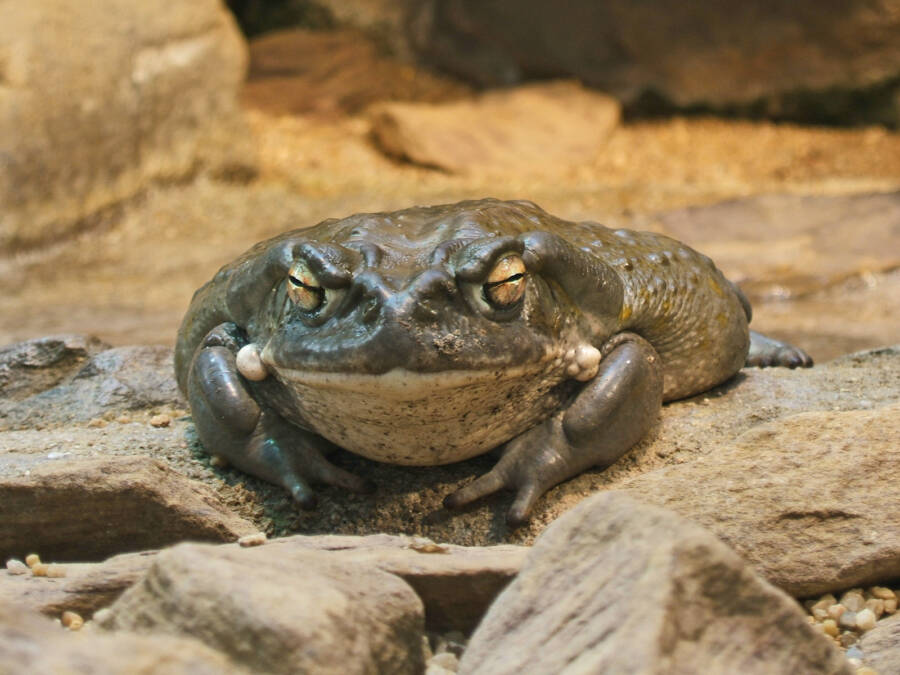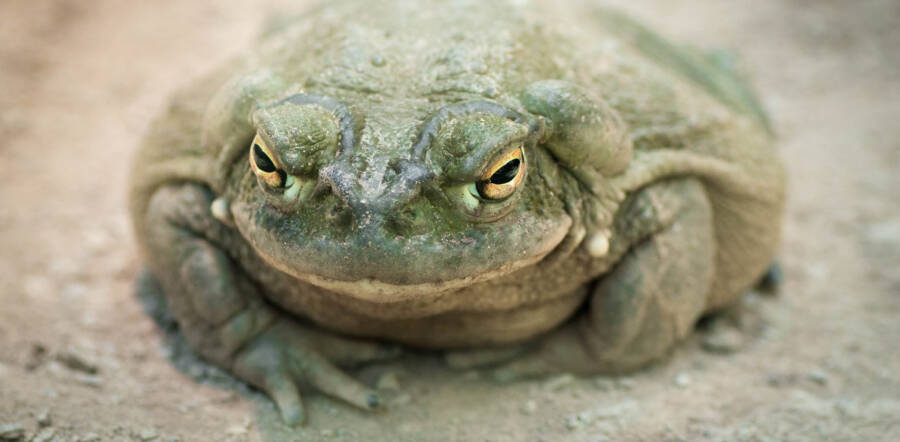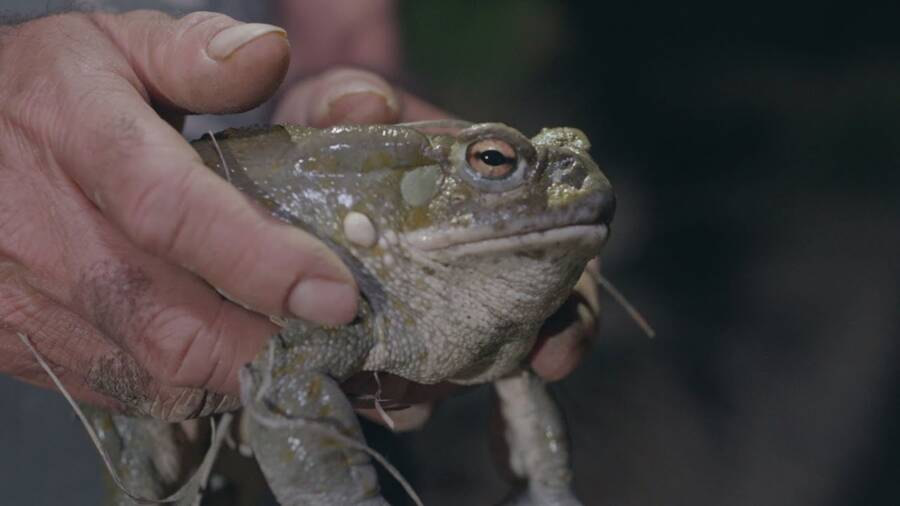The Colorado River toad secretes a psychedelic compound known as 5-MeO-DMT, which scientists believe may be an effective treatment for depression and anxiety.

Wikimedia CommonsPeople have long sought out the Colorado River toad for its psychedelic “venom,” and scientists now believe that this substance may soon be put to good use.
The Colorado River toad is greenish brown, bulbous, and can be found in the Sonoran desert, which spreads across northwestern Mexico as well as parts of California and Arizona. And scientists now suspect that a toxic substance secreted from its skin could have antidepressant properties.
This discovery is part of a larger scientific inquiry into how psychedelics can be used to treat anxiety and depression.
The Psychedelic Powers Of The Colorado River Toad’s Poison
A new study published in Nature has investigated the powers of the Colorado River toad (Incilius alvarius), also known as the Sonoran Desert toad. This toad secretes a toxic substance called 5-MeO-DMT that has psychedelic properties (“toad venom” is a misnomer, as the toad’s secretions are not injected via fangs). Though it’s powerful enough to kill a dog, humans only experience mild irritation — as well as hallucinogenic side effects.
Indeed, people have long sought out the Colorado River toad because these secretions have psychedelic properties. People will lick the toad or extract the toxin so that they can dry it and smoke it. Scientists then became curious to see if this psychedelic substance had any therapeutic potential.
“We wanted to further our understanding of psychedelics beyond the hallucinogenic effects. Psychedelics, such as LSD and 5-MeO-DMT, have shown potential for the treatment of various neuropsychiatric disorders,” Audrey Warren, a PhD student and one of the authors of the new study on the Colorado River toad, explained to All That’s Interesting in an email.

Oakland ZooA Colorado River Toad at the Oakland Zoo in California.
Warren and her colleagues from New York’s Icahn School of Medicine at Mount Sinai and Columbia University focused their study on 5-MeO-DMT, which is extracted from the toad’s secretions. Using mice, they sought to find out how it would interact with a serotonin receptor called the 5-HT1A receptor.
Most research on psychedelics has focused on a different receptor, 5-HT2A, because it produces hallucinations. But 5-HT1A has also showed potential in developing new drugs for depression and anxiety, and the toad’s poison seemed to activate it.
“We were particularly interested in studying 5-MeO-DMT, a psychedelic found in the secretions of the Colorado River Toad, because it is currently being evaluated as an antidepressant in humans,” Warren told All That’s Interesting. “We wanted to understand how 5-MeO-DMT and related drugs interact with 5-HT1A and if this interaction contributes to therapeutic effects of this class of psychedelics.”
The researchers found that the toad’s secretions had a similar antidepressant and anti-anxiety effect in mice to LSD. But the secretions did not produce psychedelic reactions — which could make it an ideal drug for humans.
“Our current findings certainly shed light on the underappreciated role of serotonin receptors other than 5-HT2A in the pharmacology of psychedelics,” Warren told All That’s Interesting. “Our research also suggests that a synthetic modified version of the naturally occurring 5-MeO-DMT can remove the psychedelic effect while retaining its therapeutic properties.”
She added: “These drugs could be safely taken at home without the supervision of a trained clinician and associated costs, for example as a stand-alone therapy or maintenance therapy after psychedelic intervention.”
Their research is part of a much larger push to use psychedelics to treat depression and anxiety.
The Connection Between Psychedelics And Treating Mental Illness
Colorado River toad poison is not the only psychedelic that scientists are looking at for its therapeutic properties. In recent years, substances like LSD, MDMA, and psilocybin (found in “magic mushrooms”) have all shown promise for treating various mental illnesses.
Studies have shown that psychedelics like these can be effective treatments for anxiety, depression, and post-traumatic stress disorder. But there’s still a lot that remains unknown about how these drugs work. And taking psychedelics to treat mental illness is far from risk-free.

YouTubeThe Colorado River toad’s secretions may play a role in a larger push to use psychedelics to treat mental illness.
As The New York Times reported in 2023, drugs like these can have adverse side effects. They can trigger a psychotic or manic episode in some users or even induce schizophrenia in people with a family history of schizophrenia or bipolar disorder.
Psychedelics can also be dangerous for people with high blood pressure, heart disease, and arrhythmias. They can trigger a seizure in people with epilepsy and could be harmful for people with traumatic brain injuries.
Still, they’ve shown great promise in treating difficult cases of depression and anxiety. And the Colorado River toad may play a part in future research about psychedelics and mental illness. According to the new study, the toad’s secretions could very well be a powerful ingredient in antidepressant drugs.
“It is exciting to see detailed snapshots of the receptor with the toad psychedelic and its molecular descendants,” Warren remarked to All That’s Interesting. “These new insights may prove useful in the development of the next generations of psychedelic-inspired medicines.”
After reading about the possibly antidepressant powers of Colorado River toad poison, discover the story of ibogaine, the controversial drug which some say helps addicts quit. Then, go inside the fascinating history of peyote, the psychedelic used by Native Americans for thousands of years.





